最新上海版牛津初中英语中考复习学案全套精品版
牛津上海版中考英语专题复习-19阅读B篇完形填空-学案(可编辑修改word版)
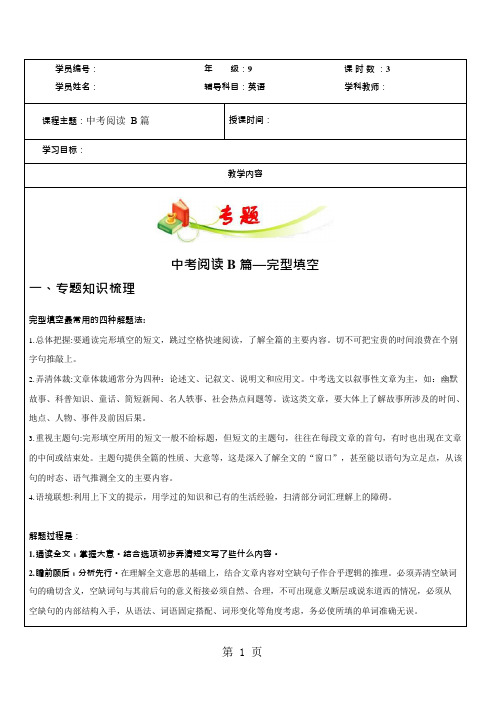
中考阅读B 篇—完型填空一、专题知识梳理完型填空最常用的四种解题法:1.总体把握:要通读完形填空的短文,跳过空格快速阅读,了解全篇的主要内容。
切不可把宝贵的时间浪费在个别字句推敲上。
2.弄清体裁:文章体裁通常分为四种:论述文、记叙文、说明文和应用文。
中考选文以叙事性文章为主,如:幽默故事、科普知识、童话、简短新闻、名人轶事、社会热点问题等。
读这类文章,要大体上了解故事所涉及的时间、地点、人物、事件及前因后果。
3.重视主题句:完形填空所用的短文一般不给标题,但短文的主题句,往往在每段文章的首句,有时也出现在文章的中间或结束处。
主题句提供全篇的性质、大意等,这是深入了解全文的“窗口”,甚至能以语句为立足点,从该句的时态、语气推测全文的主要内容。
4.语境联想:利用上下文的提示,用学过的知识和已有的生活经验,扫清部分词汇理解上的障碍。
解题过程是:1.通读全文,掌握大意。
结合选项初步弄清短文写了些什么内容。
2.瞻前顾后,分析先行。
在理解全文意思的基础上,结合文章内容对空缺句子作合乎逻辑的推理。
必须弄清空缺词句的确切含义,空缺词句与其前后句的意义衔接必须自然、合理,不可出现意义断层或说东道西的情况,必须从空缺句的内部结构入手,从语法、词语固定搭配、词形变化等角度考虑,务必使所填的单词准确无误。
3.反复推敲,攻克难关。
如果做不出来的话,可能要改变一下思路。
如实词多与文章的内容直接相关,虚词多与文章的连贯性或句子结构直接相关,如果从内容上实在看不出要填哪个单词的话,应考虑是否需要填介词、连词等。
4.验证答案,修正错误,着重注意这几点:(1)文章是否顺畅;(2)所填单词是否是最佳单词;(3)所填单词是否有拼写错误。
完型填空解题步骤:1.做题前先花 30-45 秒预览文章,大致了解文章的体裁(记叙、议论或者……)、文章内容、几个段落、是否有小标题和项目符号(这个往往是该段的主题句)。
2.做题时,首句和小标题重点读,充分体会文章论证结构,灵活使用技巧(例子与例子的关系,例子与中心句的关系,平行关系等),注意逻辑对应,指代清晰。
牛津上海版中考英语专题复习-10-情景题句转阅读c_教案.docx
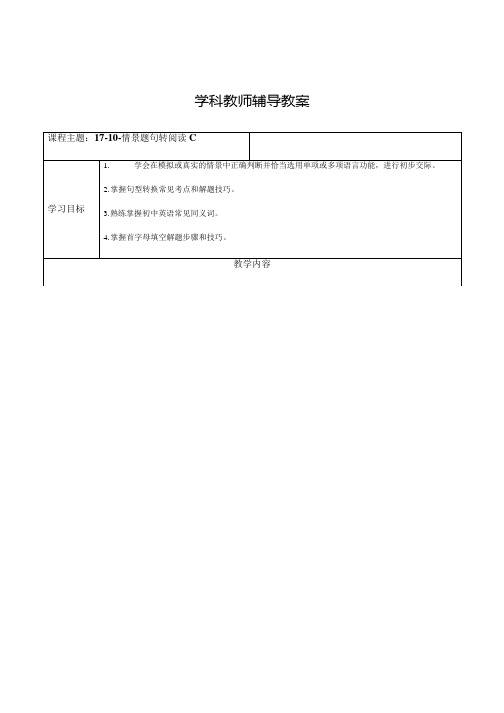
学科教师辅导教案(9)A: Merry Christmas!(2)A: When will your father come back home from work?B: So can I. /Me too,very much.I didn't enjoy it at all./It was dull.B: That's a good idea. /It sounds nice.(5)A: I got a C for my English.B: You'd better study harder. English is very important.(6)A: Fve got a bad cold today.B: You'd better go to see the doctor. /I think you should go to hospital.A: OK. I'll take your advice. /Yes, I will.(7)A: My memory i.s getting worse.B: Then you'd better practice using your mind more often, hadn't you?A: You're right, I will.(8)A: I'm getting tired easily nowadays.B: Then you'd better have at least an hour for exercise every day.A: That sounds a nice idea. I'll keep training hard.(9)A: I think we should raise some money for education.【例题精讲】例 1.一I like playing badminton.A.I like eitherB.Yes, I do tooC.Me tooD.Thank you【答案】C例 2.— A pop film star is coming to our school.A.Don't find the excuseB.Put your heart in it next timeC.Thafs all rightD.You are welcome.【答案】C【分析】A,B都属于汉式思维,其实在交际中应该以礼貌和宽恕为原则。
牛津上海版中考英语专题复习-1-语法复习阅读D_教案

牛津上海版中考英语专题复习-1-语法复习阅读D_教案学科教师辅导教案课程主题:17-1-9A语法复习阅读D学习目标 1.掌握回答问题题型的做题方法和解题技巧。
教学内容第 2 页第 3 页1.9A各单元知识点巩固复习一.语法和句型【知识梳理】1.The first thing to do when creating a comic strip is to think of a plot.=The first thing to do when you create a comic strip is to think of a plot.(1)The first thing to do…中的to do为定语,修饰the first thing。
此外,本课中不定式作定语的句子还有:It should be full of action to keep the readers interested.此句中to keep the readers interested是动词不定式作定语。
(2) … is to think of a plot中的to think of a plot为表语。
【例题精讲】例1.It is the_____time in some week that you broke dishes.A. thirdB. threeC. thirtyD. two-thirds【答案】A【分析】A例2.You are the only person_____after the war.二.语法和句型【知识梳理】1.The first thing to do when creating a comic strip is to think of a plot.=The first thing to do when you create a comic strip is to think of a plot.(1)The first thing to do…中的to do为定语,修饰the first thing。
牛津上海版中考英语复习语法+阅读+Lesson+11讲义
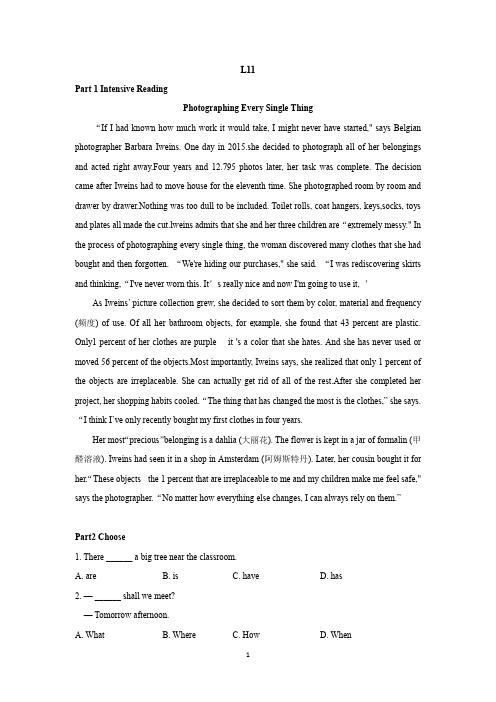
L11Part 1 Intensive ReadingPhotographing Every Single Thing“If I had known how much work it would take, I might never have started," says Belgian photographer Barbara Iweins. One day in 2015.she decided to photograph all of her belongings and acted right away.Four years and 12.795 photos later, her task was complete. The decision came after Iweins had to move house for the eleventh time. She photographed room by room and drawer by drawer.Nothing was too dull to be included. Toilet rolls, coat hangers, keys,socks, toys and plates all made the cut.lweins admits that she and her three children are“extremely messy." In the process of photographing every single thing, the woman discovered many clothes that she had bought and then forgotten. “We're hiding our purchases," she said. “I was rediscovering skirts and thinking,“I've never worn this. It’s really nice and now I'm going to use it, ’As Iweins’ picture collection grew, she decided to sort them by color, material and frequency (频度) of use. Of all her bathroom objects, for example, she found that 43 percent are plastic. Only1 percent of her clothes are purple -- it 's a color that she hates. And she has never used or moved 56 percent of the objects.Most importantly, Iweins says, she realized that only 1 percent of the objects are irreplaceable. She can actually get rid of all of the rest.After she completed her project, her shopping habits cooled.“The thing that has changed the most is the clothes,” she says. “I think I’ve only recently bought my first clothes in four years.Her most“precious”belonging is a dahlia (大丽花). The flower is kept in a jar of formalin (甲醛溶液). Iweins had seen it in a shop in Amsterdam (阿姆斯特丹). Later, her cousin bought it for her.“These objects - the 1 percent that are irreplaceable to me and my children make me feel safe," says the photographer.“No matter how everything else changes, I can always rely on them.”Part2 Choose1. There ______ a big tree near the classroom.A. areB. isC. haveD. has2. — ______ shall we meet?— Tomorrow afternoon.A. WhatB. WhereC. HowD. When3. I am ______ duty this week.A. inB. atC. onD. for4. — ______ did you buy the new bag?— Last Monday.A. WhereB. HowC. WhenD. Who5. ______ at seven this morning?A. What you didB. What did you doC. What you doD. What do you do6. I like fish, ______ my brother doesn't like it.A. SoB. orC. forD. but7. — Can you mend a video player?— No, I ______.A. mustn'tB. can'tC. may notD. needn't8. Mike speaks Chinese, ______ not much.A. soB. andC. orD. but9. They usually ______ TV in the evening.A. watchB. will watchC. are watchingD. watches10. Li Ying ______ on the ground for five hours before they finally found him.A. was lyingB. had lainC. had liedD. has lain11. It's ten o'clock in the evening. Let's ______.A. go to schoolB. get upC. have lunchD. go to bed12. Look! Li Ping and Li Lei ______ volleyball now.A. playB. playedC. are playingD. will play13. The box is light. Wang Ping can ______ it by herself.A. findB. watchC. carryD. learn14. — What are the girls doing?— They're ______ the music.A. listening toB. talking withC. coming fromD. looking for15. He is English, and ______.A. so does KateB. so Kate doesC. so is KateD. so Kate is16. There are many pictures ______ the wall.A. fromB. toC. aboutD. on17. There are about ____________ workers in that factory.A. five hundredsB. five hundredC. five hundred ofD. of five hundred18. My clock doesn't ______. Can you mend it for me?A. useB. moveC. walkD. work19. This street is much ______ than that one.A. straightB. straighterC. straightestD. more straighter20. Your room looks dirty. Will you please ______ it clean?A. takeB. makeC. letD. tidy21. — ______ children are there in your family?— Three.A. How muchB. How oftenC. How manyD. How old22. The book ______ me £20.A. paidB. spentC. tookD. cost23. Li Ping runs as ______ as Wu Dong.A. fasterB. fastC. fastestD. the fastest24. — ______ are you?— Twelve.A. How manyB. How muchC. How oldD. How far25. Li Lei always comes to school early and cleans the ______ for his classmates.A. houseB. windowC. wallD. classroom26. If it ______ tomorrow, I'll go by car.A. rainB. will rainC. rainsD. would rain27. Uncle Wang ______ in that factory since it opened in 1989.A. worksB. workedC. has workedD. will work28. Her mother told her ______ in bed.A. not readB. not to readC. don't readD. to not read29. The room is ______ dirty ______ we don't want to stay here.A. so; thatB. such; thatC. either; orD. as; as30. The medicine ______ cool, clean and dry.A. must keepB. must be keptC. must be carriedD. must be in31. I'm sorry I can't hear ______.A. what saying he isB. what he is sayingC. what saying is heD. what is he saying32. When the teacher came into the classroom, we stopped ______ cheerfully.A. LaughingB. laughedC. to laughD. laugh33. Monday is the ______ day of the week.A. secondB. twoC. threeD. third34. Would you know ______?A. who he isB. who is heC. whom is heD. whom he is35. — Oh, I've left my schoolbag in the classroom.— Don't worry, I'll ______ it for you.A. getB. carryC. bringD. take36. Have you received a letter from Jim ______?A. yetB. justC. neverD. ever37. — ______?— Quite well, thank you.A. What do you doB. What do you think of itC. How are you getting on with your EnglishD. Are you good at English38. There ______ sheep in the field.A. are muchB. is smallC. is a fewD. is a little39. — My parents have been to the United States.— Really? When ______ there?A. will they goB. did they goC. had they goneD. have they gone40. Miss Li is one of ______ in our school.A. a popular teacherB. more popular teacherC. most popular teacherD. the most popular teachers41. — Would you like to come to dinner tonight?— I'd like to, ______ I'm too busy.A. andB. ifC. soD. but42. — Will Mr. Smith be here soon?— I can't tell. Let's go and ______ when the train arrives.A. lookB. look forC. findD. find out43. ______ your help, we finished the work on time.A. ThanksB. Thanks ofC. Thank forD. Thanks to44. — May I ______ your motor?— Sorry. I ______ it to Mr. Smith the day before yesterday.e; lentB. borrow; repairedC. keep; borrowedD. lend; returned45. Johnson ______ football and knows a lot about it.A. is interested onB. is interested inC. is interesting aboutD. is interesting with46. — Where is Mr. Li Wei?— He's left a ______ saying that he has something important to do.A. excuseB. sentenceC. newsD. message47. ______ books must be produced for the children.A. Many thousandsB. Many thousands ofC. Many thousand ofD. Many thousand48. — Is it 21:00?— ______.A. Yes, it's nine in the eveningB. Yes, it's nine clocksC. Yes, it's nine in the afternoonD. Yes, it's nine hours49. I don't like this sweater. Please ______ me another.A. showB. tryC. putD. look50. Two ______ died of cold last winter in North Europe.A. hundreds old peopleB. hundred old peopleC. hundred old peoplesD. hundreds old peoplesPart3 ReadingAIn the United States, some people mark ballots( 选票 ) that bear the printed names of candidates. Others pull levers in voting machines. Americans are proud of their long history of holding free elections, but they did not i______1______ the process.Free elections were held in Athens, Greece, 2400 years ago. Some Europeans took part in local free elections d______2______ the Middle Ages. The secret ballot was first u______3_____ in 1858 in Australia.Today, voting is a new experience for many of the world’s peoples. Since World II, many w______4______ never had a voice in their government now take part in free elections.When India held its first national elections in 1951 and 1952, the process was so complicated that it took four months. F____5_____ people could read, so the ballots bore pictures that stood for the different parties. People who wanted to vote for Gandhi’s Congress party, for example, put an X under the picture of yoked oxen. In our hemisphere , there are also voters who cannot read. The Dominican Republic held its first free national election in 1962 with rainbow- coloured ballots. The different colors i_____6_______ the parties for people who could not read the candidates’ names.Today, computers are changing the way people vote. In 1974, Mexico set upa computerized voting system. In the future, people all over the world may beable to vote by touching computer screens. These screens could show candidates’ names, pictures, or party s_____7_______.Any change that encourages people to vote helps government work. Orgeon lets people vote by mail. Texas has voting in convenient spots such as malls. As long as people want to have a voice in the government , they will try new ways of voting.BA Mahogany Piano (II)But the payments came in, all 52 of them as agreed.-- sometimes with coins taped(Hl# 4ѣl)to a 3x5 inch card in the envelope. It was unbelievable!So, I put the incident out of my mind for 20 years.Then one day I was in Memphis on business, and after dinner at the Holiday Inn, I went into the lounge. As I was sitting at the(1)b having an after dinner drink, I heard the most beautiful piano music behind me. I looked around, and there was a lovely youn g woman playing a very nice piano.Being a pianist of some ability myself, I was completely surprised by her great(2)s and I picked up my drink and moved to a table beside her where I could listen and watch. She smiled at me, asked for requests, and when she took a break she sat down at my table."Aren't you the man who sold my grandma a piano a long time ago?"It didn't ring a bell, so I asked her to (3) e . She started to tell me, and I suddenly remembered. My Lord, it was her! It was the little barefoot girl in the feed sack dress!She told me her name was Elise and since her grandmother couldn't(4) a to pay for less, she had learned to play by listening to the radio. She said she had started to play in church where she and her grandmother had to walk over two miles, and that she had then played in school, had won many (5) a . She had married a lawyer in Memphis and he had bought her that beautiful piano.Something else entered my mind. “Look, Elise” I asked, “May I ask you what kind of (6) w __ is your first piano made of, the one your grandmother bought?It’s red mahogany” she said, “why?”My throat tightened. After quite a few minutes, I said, “I’m (7)p of you, but I have to go to my room, because men don’t like to be seen crying in public.。
牛津上海版初三九年级上英语 unit2 同步复习教案-精选教育文档
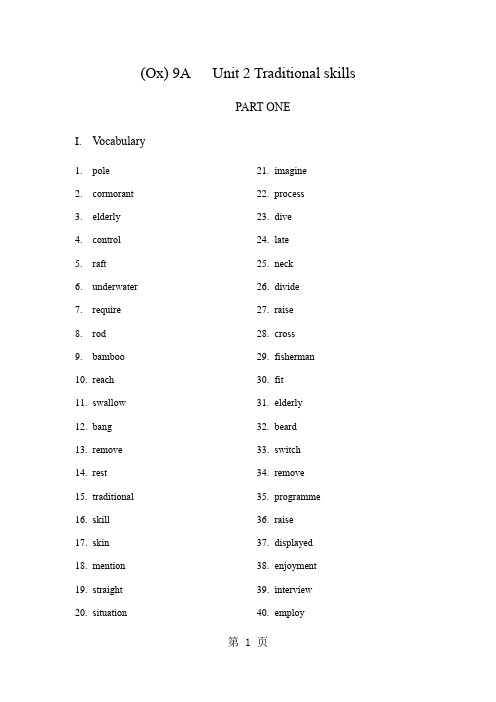
(Ox) 9A Unit 2 Traditional skillsPART ONEI.V ocabulary1.pole2.cormorant3.elderly4.control5.raft6.underwater7.require8.rod9.bamboo10.reach11.swallow12.bang13.remove14.rest15.traditional16.skill17.skin18.mention19.straight20.situation 21.imagine22.process23.divete25.neck26.divide27.raise28.cross29.fisherman30.fit31.elderly32.beard33.switch34.remove35.programme36.raise37.displayed38.enjoyment39.interview40.employ41.crew42.lorry43.interpreter44.translate45.darkness 46.hang47.well-built48.thinly-built49.curly50.baldeful Expressionseful Structures/Grammar1.Damin sits on the side of the river cooking o meal, with a large bird on his head.2.He is thin, and of average height, but he is very fit.3.Although he is an elderly man, he is strong enough to control his raft in the riverwhere he lives and works with his cormorants.4.They can dive down 25 metres, and stay underwater for up to two minutes.5.Damin’s fishing trips often begin in the late afternoon.6.He sets off on his bamboo raft with his birds.7.He ties a piece of grass around the neck of each bird, so that it cannot swallow thefish.ter some of the fish are sold, and the rest are divided between Damin’s familyand the cormorants.9.In 50 years, perhaps there will be no more cormorant fishermen in the world.10.Their large feet are used to push them quickly through the water.PART TWOI.Word Formation1.frightened (v.)2.hang (ved)3.ability (v.)4.attract (a.)5.tradition (a.)6.assist (n.)7.tourist (n.)8.image (n.)9.nature (a.)e (v.)11.invent (n.)12.long (n.)13.sit (n.)14.fisherman (pl.)15.height (a.)plete the sentence with the given word in the correct form.1.Paper cutting is a Chinese skill with a history of thousands ofyears. (tradition)2.Young kids are always full of . (imagine)3.Recycling and materials can help reduce the amount of land pollution.(use)4.Shanghai is an city. People from all over the world like to visit itevery year.(attract).5.These software will us to connect computers to the Internet moreeasily. (ability)puters were a wonderful in 1920s though they were very huge atthe time.(invent)7.The classroom is ten metres in . (long )8.We human beings are closely related to the world in someway.(nature)9. A painting was on the wall of my bedroom.(hang)10.The ________ scenes in the film made the audience full of fear. (frighten)11.The detective dealt with many cases with the help of his . (assist)12.Helen used to be a guide in a travel agency.(tourist)III.Sentence Transformation1. Both of Mary's parents work in this hospital. (改为否定句)________ of Mary's parents ________ in this hospital.2. We can save water by fixing dripping taps. (划线提问)________ ________ we save water?3. They will produce more cartoon films in the next five years. (改为被动语态)More cartoon films will ________ ________ in the next five years.4. Don't pick the flowers in the garden. (改为反意疑问句)Don't pick the flowers in the garden, ________ ________?5. He frightened me because he made a strange sound behind me 5udcienly. (保持句意不变)He ________ me a ________ because he made a strange sound behind me suddenly .6. interested in, people, are, few, cormorant, fishing, in the modern world, young(连词成句)_________________________________________________________________. IV.Multiple Choice1.Half an hour ________, they returned school.A. lateB. afterC. laterD. in2.--Frog, Mo Yan’s novel, please.--Sorry, it ________ just now. But it will come out again soon.A. had been sold outB. is sold outC. has sold outD. was sold out3.Today, the forests have almost gone; we must stop people ________ down tomany trees.A. to cutB. cutC. from cuttingD. from cut4.________ people come to Jilin to visit Mount Changbai every year.A. Millions ofB. Million ofC. MillionsD. Million5.I know ________ about Japanese. You may go and ask him.A. a fewB. fewC. a littleD. little6.— The wood looks very nice. What’s it made ________?— Wood, and it is made ________ Shanghai.A. from; inB. of; inC. from; byD. of; by7.Uncle Wang used to ________ a newspaper at home after supper. But now he isused to ________ out for a walk.A. read; goB. reading; goC. reading; goingD. read; going8.Which of the following words is pronounced as /waɪld/?A worldB wideC wildD wind9.Mike has only driven to the pub to show his new car – he usuallywalks.A ofB offC aroundD with10.When is dressed the same, worrying about what you look like isn’t soimportant.A someoneB anyoneC no oneD everyone11.We use an online bill-paying service, and we buy almost everythingcredit card.A onB byC forD at12.Any way to improve this ‘welcome letter’ – I want to make sure itsounds .A friendlyB carefullyC gentlyD politely13.earthquake recorded in the 20th century occurred in Chile in 1960.A LargeB LargerC LargestD The largest14.I wonder whether buying an electric car a good idea.A beB amC isD are15.I don’t mind back home. I feel like some fresh air.A walkB walkingC to walkD to walking16.The sign says: “Passengers show their tickets and passports.”A mustB mayC canD should17.I 30 pages of the book so far, but I hope to finish it by next week.A readB am readingC have readD will read18.It was a terrible journey, we got there safely in the end.A andB orC soD but19.We’ll have to can cel the school sports meeting it snows tonight.A ifB althoughC unlessD since20.When we home last night, we saw a strange object in the sky.A driveB droveC were drivingD had driven21.The police required the traveler for his luggage.A checkB to checkC checkingD checked22.can we help victims after a natural disaster?A WhoB HowC WhereD When23.Please fruits and vegetables in a basin!A washB washingC to washD washed24.Half of the Beijing’s private cars off the roads due to heavy smog onFriday.A orderB are orderedC orderedD were ordered25.amazing the stage play War Horse is!A WhatB What aC What anD How26.–More underground lines should be built in our city!A I’m glad to hear thatB Not exactlyC I couldn’t agree moreD I’m on your side27.–I’m sorry I’m late – the traffic was terrible.–The traffic situation is getting worse these days.A That’s OK.B You’re welcome.C I don’t think so.D Please go ahead.V.Reading comprehensionSection AA young college student thought that he chose the wrong major(专业) at a common college ,so he drank every day and didn’t study at all. He became more and more 75___.But he was never absent from Professor Yang’s biology class. He liked the course. Besides, Yang’s class was so interesting that he always listen ed carefully, never ____76__ whether the other students were paying attention or not in class.Once he put a ___77__ in the homework he handed in , saying : “Professor ,it is said that today’s college students are cheaper than potatoes. Do you agree?”That day Professor Yang invited the young student to his home after class. When he came, he found the professor at a table with food on it. They drank ___78__ over their meal.When they became half drunk, the professor took out a small potato that was sprouting (发芽的). “Do you know how much this costs?” he asked the young man. “It’s soft but poisonous (有毒的). Nobody will take it even if it’s ___79___. He then threw the potato away.The professor then showed him another potato. It was half the size of a football and quite round. “This potato is organic(有机的). It is not only large and fresh but also free of ___80___. It is in high demand and quite expensive.”The young man was impressed by what he’d heard. “Be such a potato,” said the professor.75. A) surprised B) confident C) upset D) attractive76. A) caring about B) playing with C) getting ready for D) depending on77. A) coin B) note C) ticket D) menu78. A) luckily B) sadly C) worriedly D) happily79. A) free B) beautiful C) expensive D) safe80. A) money B) exhibition C) pollution D) healthSection BAlthough the first airplane did not fly until 1903, flying soon became the fastest method of transport. Today it is 75 people's favorite way of traveling long distances because it has a lot of advantages. The first airplanes were not big or powerful enough to carry more than a pilot, but during the First World War (1914-1918) larger aircraft with up to four engines were 76 to carry bombs(炸弹). After the war some of these were changed to carry a few passenger services. In 1919 the first regular passenger services were started between several cities in Europe.Air transport was even then too 77 for most cargoes(货物), but mail began to be carried by air at an early stage. This was partly because letters are small and light, and partly because businessmen, especially, were prepared to pay more for their mail to be delivered by the fastest method. 78 , in the United States, where letters could take over a week to cross the country by train, airmail services were the first regular transport flights.The early passenger aircraft could carry only about 12 passengers, and only enough 79 for short journeys. For long distances, such as from Europe to the United states, filled with very light gas and able to float through the air, began to be used in the 1930s.By the end of the Second World War in 1945, much larger airplanes had been made. At the same time, military(军事的) airfields had been built all over the world, and long-distance routes had been set up. After the war, the introduction of the jet engine, which 80 much greater power, allowed even bigger and faster aircraft to be built. Today's wide-bodied airplanes can carry as many as 800 passengers.Modern air transport passenger services are quite convenient. Air transport has allowed more people to travel abroad than ever before.75. A) quietly B) easily C) directly D) recently76. A) recognized B) considered C) developed D) described77. A) expensive B) ordinary C) traditional D) private78. A) After all B) For example C) In addition D) On average79. A) time B) money C) food D) fuel80. A) produces B) attracts C) reuses D) spreadsVI.Read the passage and fill in the blanks with proper wordsDo you want to make homework simpler? OxfordLearning founder and CEO Dr.Nick Whitehead said,"Homework might be an unavoidable(不可避免的)part in school, but it doesn't have to be that boring part. With the right skills in place,students can turn ho mework from headache-including to trouble-free."These steps will make an obvious d 81 .Use your notebooksThe brain is able to finish great works,but it is not a 82 perfect.Studentsshould never rely on it to remember all school details.When a teacher assignshomework,students should write the details in their notebooks.According to Whitehea d,to make them effective,students n 83 to remember to take the note books out o f the school bags at night,open them up,and read over the night's list.Remove distractions(使注意力分散的事物)Computers on, music on, text messages receiving…Whitehead says if studentsaren't doing research,they should turn off all the above electronics,and focus on thetask at hand for a set period of time.They'll find that it is e 84 to concentrateand that homework takes less time.Think activelyGetting homework done is the name of the game, but what happens if studentsare struggling with a question or can't work out an answer? When facing difficulties,it is wise for the student to take a small break, then r 85 to look at the problemagain.Get organizedHomework is often the most disorganized part. Whitehead recommends," Students should keep all the homework-related things in a bin,so they don't waste time s86 for pens or rulers."He also recommends picking the same place to do homewor k every night, and(when possible)completing homework at a c 87 time each day.VII.Translation1.这个比萨被分成了六块。
牛津上海版中考英语专题复习-2-名词冠词及阅读A_学案

学科教师辅导学案1.9A知识点复习一.名词【知识梳理】1.专有名词和普通名词(1)专有名词表示特定的或者独无二的人或物,如人名、地名、机构名称等。
1)专有名词的首字母要大写,如China,Africa,Mr. Green。
2)一般的人名、地名通常不带定冠词,但河流、海洋、群岛、海峡等名称带定冠词,如:the Pacific Ocean,the English Channel。
3)某些由普通名词组成的专有名词也带定冠词,如, the Great Wall , the Children’s Palace, the People’s Park, the Chinese New Year, the United States of America。
4)专有名词一般没有复数形式,但表示姓的专有名词变成复数时,指该姓的一家人,前面必须加定冠词,如:the Greens, the Smiths, the Wangs。
(2)普通名词表示一类人、物或事,可以分为个体名词、集体名词、物质名词和抽象名词。
1)个体名词指人或物的个体,是可数名词。
2)集体名词是一群人或物的总称,有些是可数名词,有些是不可数名词。
如:可数名词:a class—two classes a team—two teams不可数名词:furniture equipment件和原因等要点,总结全文的中心思想。
2.常见考查方式3.常见题型及解题方法——细节题(又称事实询问题)常见提问方式:以what, who, which, when, where, how或why等词引导,就文中某句、某段或某一具体细节提问。
如:There was once a large, fat woman who had a small, thin husband. He had a job in a big company and was given his weekly pay every Friday evening. .As soon as he got home on Fridays, his wife used to make him give her all his money, and then she used to give him back only enough to buy his lunch in the office every day.( ) How much money was the husband allowed to keep every day?A. Just enough to buy chocolates.B. Just enough to buy a sandwich.C. Just enough to buy hi.s lunch in a restaurant.D. Just enough to buy his lunch in the office.筒析:这是一道典型的细节题,因为它的答案可以直接从文段中找到。
牛津上海版中考英语专题复习-6-代词宾从及应用文_教案
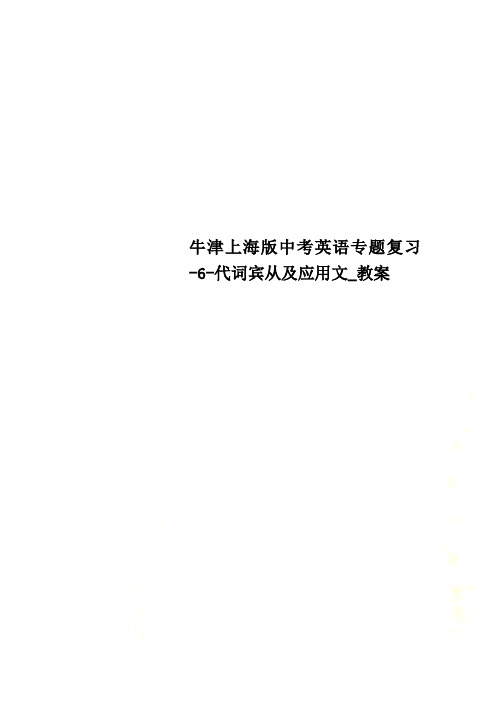
牛津上海版中考英语专题复习-6-代词宾从及应用文_教案学科教师辅导教案课程主题:17-6-代词宾从及应用文学习目标1.掌握人称代词的主格和宾格的区别;2.掌握形容词性物主代词和名词性物主代词的用法;3.掌握反身代词、指示代词、疑问代词和不定代词的基本用法。
4.掌握宾语从句的连接词、语序、时态和简化。
5.掌握中考作文写作要求和技巧。
6.掌握常见的作文写作体裁和写作套路。
7.认识并避免常见的写作错误。
教学内容第 2 页第 3 页1.1. 动词及反意疑问句复习一.代词【知识梳理】1.不定代词不明确指代某个特定的人或事物的代词叫不定代词。
英语中的不定代词常常成对出现,如some 和any, all 和both, neither 和either, each 和every, other 和another, much 和many, one 和no, none和no one, few 和a few,little 和a little,等等。
另外,还有由some, any, every, no 与body, one, thing构成的复合不定代词(somebody, anybody, everybody, nobody, someone, anyone, everyone, no one, something, anything, everything, nothing)。
1)some 和anysome 和any都可修饰或指代可数名词和不可数名词;some 一般用于肯定句,any一般用于疑问句和否定句。
如:I must get some fruit in the market. 我得在市场上买点水果。
Do you have any books for children? 你有适合小孩子看的书吗?【说明】(1) 当表示请求或要求并希望对方能给出肯定的回答时,some 也可用于疑问句;any 表示“任何的”之意时,也可用于肯定句。
牛津上海版中考英语专题总结复习16首字母填空动词学案
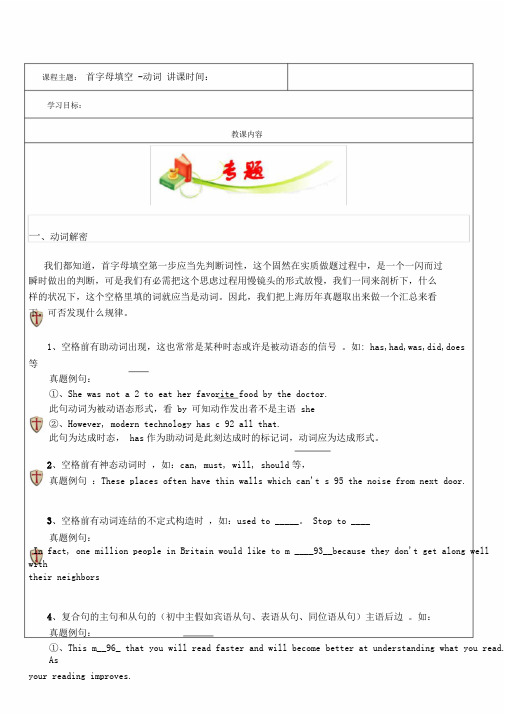
课程主题:首字母填空 -动词讲课时间:学习目标:教课内容一、动词解密我们都知道,首字母填空第一步应当先判断词性,这个固然在实质做题过程中,是一个一闪而过瞬时做出的判断,可是我们有必需把这个思虑过程用慢镜头的形式放慢,我们一同来剖析下,什么样的状况下,这个空格里填的词就应当是动词。
因此,我们把上海历年真题取出来做一个汇总来看下,可否发现什么规律。
1、空格前有助动词出现,这也常常是某种时态或许是被动语态的信号。
如: has,had,was,did,does等真题例句:①、She was not a 2 to eat her favorite food by the doctor.此句动词为被动语态形式,看 by 可知动作发出者不是主语 she②、However, modern technology has c 92 all that.此句为达成时态, has作为助动词是此刻达成时的标记词,动词应为达成形式。
2、空格前有神态动词时,如:can, must, will, should等,真题例句:These places often have thin walls which can't s 95 the noise from next door.3、空格前有动词连结的不定式构造时,如:used to _____。
Stop to ____真题例句:In fact, one million people in Britain would like to m ____93__because they don't get along well withtheir neighbors4、复合句的主句和从句的(初中主假如宾语从句、表语从句、同位语从句)主语后边。
如:真题例句:①、This m__96_ that you will read faster and will become better at understanding what you read.Asyour reading improves.②、and try to forget that you d 101 this when you wake up the next morning第 1 页5、and 或or 等并列连词连结的两个句子时,某一个句子缺少谓语时。
- 1、下载文档前请自行甄别文档内容的完整性,平台不提供额外的编辑、内容补充、找答案等附加服务。
- 2、"仅部分预览"的文档,不可在线预览部分如存在完整性等问题,可反馈申请退款(可完整预览的文档不适用该条件!)。
- 3、如文档侵犯您的权益,请联系客服反馈,我们会尽快为您处理(人工客服工作时间:9:00-18:30)。
2020年上海版牛津初中英语中考复习学案全套精品版Chapter 1课前准备:1600词必会单词1. ________ n.. 兴趣,爱好2. ________ n.(英)班级3. ________ n. 物理学4. ________ adv.极度地5. ________ v. 使整洁6. ________ adj.懒惰的7. ________ n.说话,发言 8. ________ adj.(令人)乏味的9. ________ v.关上,关闭 10. ________ n.地理11. ________ n.大学 12. ________ n.欧洲人13. ________ n.演员 14. ________ n.女演员15. ________ n.事实课前准备:重点短语1.get a letter from sb.=hear from sb.2.each sport=every sport=each of the sports3.take a look(n.) at=look(v.) at4.at the top-right corner5.at the end6.on the next page7. a postal code8. a post office9.deliver letters10.would like to do sth.=want to do sth.11.about five feet tall12.a boy called =a boy named =a boy with the name of13.play chess14.live with parents15.be born in/on.=come into this world16.in Form One=in Grade One17.sports fields18.o ne’s ambition is to be……19.enclose a photo of oneself20.w rite to sb.=write a letter to sb.=write sb. a letter21.hope(wish) to do sth.22.on October 12 ,1986=on 12 October,198623.in the middle24.best wishes25.a photo of myselfa photo of mine26.for example27.as well28.a ll in =very tired29.tidy his room= clean his room30.s hut up31.an honest man32.a one-way road33.an actor34.an actress35.an encyclopaedia36.a telephone directory37.an envelope38.a uniform39.an hour40.i n alphabetical order41.a poor couple42.the Year of Horse43.the good omen of44.be destined to45.change one’s fortune46.try very hard to do sth.=do one’s best/try one’s best47.the French Embassy48.w ork as a chief cook49.send … to …50.t he China Drama Academy51.vowel sound52.consonant sound53.leave school54.decide to do sth.55.in hospitalin the hospital一四三中学――――九年级英语第一轮复习学案8B Chapter One学习目的:1.掌握reading词汇和重点句型2.熟练掌握wh-特殊疑问句及冠词用法3.能够学以致,用给国外的笔友写一封信Reading一、短文填空Dear MayHi!I saw your name and ________ in‘Pe n-friends’magazine,and I would like to________ your pen- friend .First, I will tell you some things about ________ . My name is Sidney Li Pei-chun.I'm fourteen years old .I'm about five ________ tall .I have short black hair and brown eyes .My favourite ________ is playing computer games .I also enjoy playing chess.I live with my parents.They came to England about 30 years ago.They came from Hong Kong, but I have never been there .Now my parents ________ a Chinese restaurant in Newcastle .We live in a small house near our restaurant .I was born in Newcastle in 1986 .I can speak Chinese,but I cannot write it very well .I have a brother ________ Edwin .He is 23 .He works ________ an architect, in London.I'm in ________ One at Walker School.It is near my house,and so I can walk to school.I like my school ________ the teachers are very friendly.My school has many sports fields .I am ________ on sports .I enjoy playing rugby and badminton in the winter, and tennis in the summer. My best ________ at school is physics .My ________ is to be an engineer.I ________ a photo of myself and some school friends.I am in the middle.I hope you will write ________ me soon,May,and tell me all about yourself.Best wishesSidney二、根据课文回答问题1. Who wrote this letter?2. How did Sidney know May’s name and address?3. Why did he write this letter?4. What’s Sidney’s Chinese name?5. When was he born?6. What does Sidney look like?7. What’s his favorite hobby?8. Who does Sidney live with now?9. When did his parents go to England?10.Did Sidney come from Hong Kong?11.Who is Sidney’s brother?12.What job does his brother do?13.Where does Sidney study?14.In which form does he study?15.How does he go to school?16.Why does he like his school?17.What’s he keen on?18.What sports does he do in different seasons?19.What is his ambition?20.Where is he in the photo?Listening三、读对话完成表格Language四、对画线部分提问总结:特殊疑问句 = 疑问句( 短语 ) + ________________ ?1对时间提问用 ________ 2对具体钟点提问用 ________3对原因提问用 ________ 4对地点提问用 ________5对人提问用 ________ 6对物主代词和名词所有格提问所有格提问用 ________ 7对事或职业和数量含义的名词提问用 ________8意为哪个。
即对人也对物提问用 ________9对方式、程度、状态等提问用 ________ 10对年龄提问用 ________11对 in+时间段提问用 ________ 12对频率提问用 ________13时间段或物体的长度提问用 ________14对可数名词的数量提问用 ________15对不可数名词数量提问用 ________1They bought a new bike yesterday.2She is a nurse.3She is my teacher.4He bought the red one.5It is my coat.6I am looking for my sister.7I get up at six.8I am from Hubei.9I went to school late because I got up late.10I am getting on well with it.11My bag is red.12They are five yuan.13I wash it twice a week.14He will be back in four days.15I didn't come to class yesterday because I was ill.B long answer 主语的人称,动词的时态short answer 疑问副词回答常有介词,信息点要答全五、冠词填空(a an the / )(一) 不定冠词:“an” 用于以 __________ 开头的名词前,“a”用于以 __________ 开头的名词前,常用于可数名词 __________ 形式前,表示数量 ______ 。
